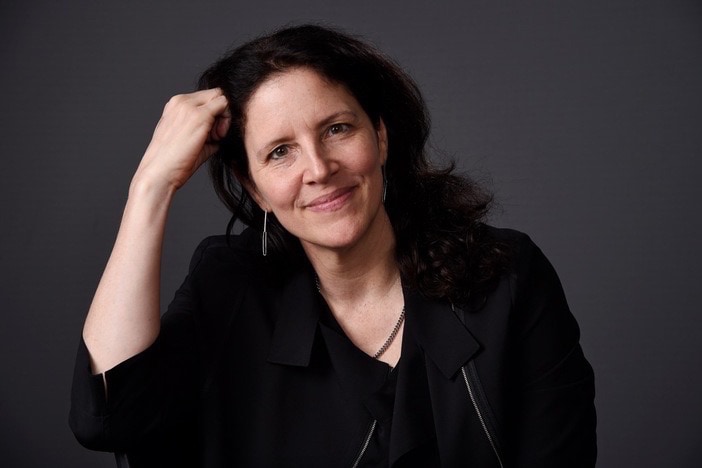Laura Poitras has for years been monitored and harassed by the US security agencies whose surveillance activities, leaked by whistleblower Edward Snowden, she helped expose.
“My ‘threat rating’ was the highest the Department of Homeland Security assigns.”
The work of the investigative journalist and documentary filmmaker Laura Poitras is intimately bound up with two of the most important surveillance and access to information stories of the 21st century: the exposure of the US government’s mass, unauthorised data collection programs and Wikileaks.
Poitras has received numerous prizes for her work revealing secret government wrong-doing, but she has also paid a heavy personal price. Anyone who decides, like Poitras, to shine a light into the dark corners of state intelligence operations, quickly finds themselves (and those closest to them), targets of the very people and practices that they are seeking to expose. The form this targeting takes was eloquently described in an anonymous, encrypted email that Poitras received in 2012:
“You asked why I picked you. I didn’t. You did. The surveillance you’ve experienced means you’ve been ‘selected’ – a term which will mean more to you as you learn about how the modern SIGINT systems works. For now, know that every border you cross, every purchase you make, every call you dial, friend you keep, article you write, site you visit, subject you type, and packet you route is in the hands of a system whose reach is unlimited but whose safeguards are not. Your victimisation by the NSA (National Security Agency) system means that you’re well aware of the threat that unrestricted secret police pose for democracies. This is a story few but you can tell.”
The author of this message was an unknown, former NSA employee who wanted to share some explosive classified information: Edward Snowden.
The middle daughter of well-off philanthropists, Poitras, 53, originally wanted to be a chef. However, after finishing high school, she moved to San Francisco and enrolled on a film course, thereby setting her life’s direction. She made her first film, Exact Fantasy, in 1995, but her most powerful work focuses on US foreign policy and security since the 9/11 terrorist attacks on US soil: in 2006, she produced My Country, My Country, an Academy Award-nominated documentary about the US occupation of Iraq; in 2010, she produced The Oath, which deals with two Yemeni men tangled up in the US’s ‘War on Terror’; in 2012, she released a short film called The Program, which was based on interviews with William Binney (an NSA veteran turned whistleblower), and which made two startling revelations. The first of these was the existence of a surveillance system that, although originally intended to monitor foreign spying, had been turned on US citizens after 9/11; the second was the existence of a massive data collection centre in Utah, where US citizens’ telecommunications information could be inspected without a warrant. The Program anticipated her later, more famous work with Edward Snowden.
Because of her journalism, Poitras has been under surveillance by US intelligence for more than ten years. She told PBS in 2006:
“Since completing My Country, My Country, I’ve been placed on the Department of Homeland Security’s (DHS) watch list. Returning to the US in August 2006 after a screening in Europe, I was detained at two airports. In Vienna, I was escorted out of the terminal to a police inspection area and was notified by security that my ‘threat rating’ was the highest the Department of Homeland Security assigns. Upon arrival at JFK airport, I was yet again escorted by security to a holding area until the DHS authorised my entrance into the United States.”
In 2012, her collaborator, the journalist and lawyer Glenn Greenwald, reported that Poitras had been subjected to a constant campaign of harassment by US border agents, suffering detentions, interrogations and/or confiscations of her computer and cell phone on more than fifty occasions. As Poitras says in her 2014 documentary, Citizenfour, this harassment forced her to relocate from the US to Berlin.
The seeds of Poitras’s most important project were sown in 2012, when she was emailed anonymously by Edward Snowden. That contact led to Poitras, Greenwald and the Guardian journalist Ewen MacAskill flying to Hong Kong in 2013 for their now famous, hotel room debriefing of the young whistleblower. The resulting exposure of the US’s global surveillance system (the subject of Citizenfour) caused outrage around the world and prompted some positive legislative developments: many have argued that the revelations led to the 2015 USA Freedom Act, which placed limits on the scope of US government surveillance operations and introduced increased transparency and oversight measures.
For their work with Snowden, Poitras and Greenwald won the George Polk Award for national security reporting in 2014; Citizenfour won the Oscar for best documentary in 2015.
Poitras’s 2017 film Risk is a documentary about Wikileaks, which she began working on in 2011. Although a strong defender of Wikileaks’s work, Poitras admits to questioning some of its decisions around publishing names and personal information. According to Poitras, Wikileaks’s founder Julian Assange was unhappy with the final cut of the film, partly because it included material on a Swedish investigation into rape allegations made against him. That investigation has since been dropped.



